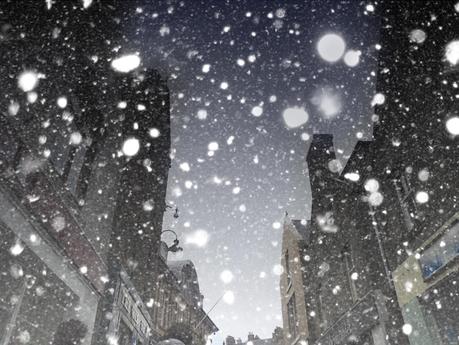Do read them first and then come back!
That night, I couldn’t bear to be alone, and slept on *Abby’s floor. I went to school the next day and tried to behave as if nothing had happened.
The only physical signs of what I’d been through were red marks on my wrists from where the ropes had rubbed my skin as I worked myself free. After a few days the redness faded.
Six weeks later it went to court. He was sentenced to four months in prison. The deputy head-teacher of the school contacted the local paper and asked them to be discreet in their reporting. They assured her they would be, and that they would print nothing that could give away my identity.
I lived in a boarding house with over fifty other island girls, so the story had already spread. But only the police, the matron, Abby, my family – and the people in court – knew the details. Until that Friday morning when the newspaper came out.
 I was in the school library when a boy from my class arrived with the paper. They hadn’t had such a good front page story in years. They broke their promise. Every embarrassing detail was on that front page. I felt exposed all over again. At morning recess, I could not face the common room. I was in my final year and by then so many kids had left school that we had dwindled to a small group of about thirty. I could not bear the questions that I anticipated from my class-mates, so I stood out in the hallway, feeling eyes upon me, imagining that everyone in the school had read the paper and would know that first page report was about me. I felt sure they could sense my shame.
I was in the school library when a boy from my class arrived with the paper. They hadn’t had such a good front page story in years. They broke their promise. Every embarrassing detail was on that front page. I felt exposed all over again. At morning recess, I could not face the common room. I was in my final year and by then so many kids had left school that we had dwindled to a small group of about thirty. I could not bear the questions that I anticipated from my class-mates, so I stood out in the hallway, feeling eyes upon me, imagining that everyone in the school had read the paper and would know that first page report was about me. I felt sure they could sense my shame. You might say I had nothing to feel ashamed about, and you would be right. But anyone who has been a victim of this kind of crime, or perhaps of any crime, knows that shame defies logic. The deputy head teacher understood that. Shortly after recess she came to find me, and told me I could take the rest of the day off. She also told me that if I wanted to talk about it I could come to her. I had never seen her as someone to confide in, so I said I was okay. It was all in the past.
As I went back to my room, the deputy head headed off to the newspaper to give them a piece of her mind! That felt like a hand holding mine, an arm around me.
His prison was over two hundred miles away from the islands, so I thought I could relax, feel safe.
But then a letter came – not to me, but to Abby. He was getting out after three months for good behavior. He was sorry for what he’d done and wanted to see her, to convince her he still loved her. I cannot remember now if she wrote back to him, but if she did it was not to say: yes of course I’ll meet with you, the man who is spending time in jail for attacking my best friend.
I dreaded the day he would return to the islands. I expected him to turn up at our boarding house, demanding to see me, yelling at me for putting him in prison. I expected him to appear on street corners, to follow me and harass me. But the day passed, the weeks passed, and he didn’t turn up.
I left school and got a summer job. After that, my plan was to take up the place I’d been offered at art school. Then the results of my final school year’s work came through. Those results made no difference to the art school acceptance – it was unconditional. But they made a difference to me. My self-acceptance was conditional, and when the results were not what I hoped for, it plummeted. I was no good at art, and no good at anything. So, much to my parents’ distress, I rang the college to say I wasn’t coming and got a job weighing fish in a factory.
I made friends; we went out dancing and to bars. One night in one of those bars, he was there. He came up to me, told me he was sorry for what he’d done. I said thank you, and tried to believe that the fear would go now.
One morning a new guy started work the factory. I saw him from a distance, and I knew the fear hadn’t gone. I avoided him and said, “No,” if a white-coated supervisor asked me to work in the same area as him.
In that factory, I was one of the few people who didn’t smoke, and at regular intervals throughout the day, a “white-coat” would yell, “Smoko!” Everyone trooped off for cigarettes. Even though I didn’t smoke, I followed the other women into a little room. The air was soon filled with gray clouds and gossip.
Joan was the queen bee of the smoko room, married to a “white-coat,” and with a sharp and dirty line of talk. I was scared of her, and did my best to make sure I did nothing to draw her attention. Still she turned on me, one smoko, and demanded to know why I was so nasty to him. He’d told her that I was his ex-girlfriend and that I wouldn’t speak to him. He was hurt and sad, she said, and I could at least be civil.
I told her the truth. I can’t remember how much longer he worked at the factory after that, but it wasn’t long. My fear didn’t leave with him, but I did eventually go to art school. I did eventually go to university and learn to write. And I did eventually write about the time I was held hostage. And as I wrote it, I realised that it truly, truly was not my fault.
I am taking part in the Creative Buzz Hop. If you would like to read more creative posts or join in with one of your own, click the button below:


